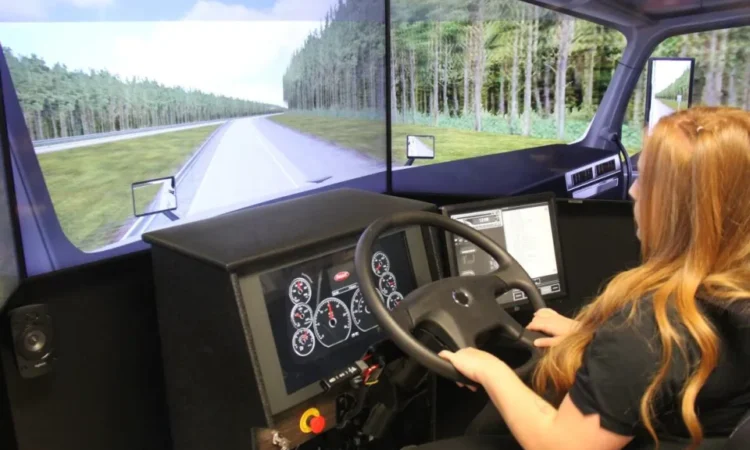Windsor-Essex school rolling out simulator as part of training for students
Here’s what this high tech truck driving simulator can do
7 days ago
Duration 2:30Raymond St. Jean, general manager of Northstar Trucking School in Windsor, Ont., talks about how the Virage truck driving simulator can help students get acquainted with driving a transport truck. Student truck driver Gaelyn Galbraith-Taglioni gets behind the wheel.
Gaelyn Galbraith-Taglioni puts the key into the ignition and the engine begins to turn over.
She’s behind the wheel of a transport truck on a winding rural road with a speed limit of 80 km/h. The weather shifts back and forth from sunny, to rainy to snowy. Then glare from the sun affects her view.
- University of Waterloo students race driverless car at Indianapolis Motor Speedway
- VideoVirtual reality for bus drivers rolls across Ontario to test skills
At one point, a jogger appears out of nowhere and starts running across the road. But she reacts in time.
“Good job, you stopped your vehicle,” said Raymond St. Jean, general manager of Northstar Trucking School in Windsor, Ont.
“Now, you can proceed.”
Galbraith-Taglioni was experiencing driving a big rig without setting foot inside one. The student truck driver was using an advanced driving simulator made by the Quebec company Virage.
St. Jean says the trucking school is one of few in southern Ontario that have the simulator. Starting in early June, all Northstar students will have to complete 25 hours of training on it.
“It is really awesome. It’s a great way to get ready for the road,” said Galbraith-Taglioni. “I think it’s really helped me out on the road because they can put you in real life experiences that you’re going to experience… especially with shifting. It’s definitely improved my shifting quickly.”
The simulator is supposed to give students a taste of what driving a tractor trailer is like — right down to look of the dashboard on specific truck models, and the feel of the seat.
It can help them get comfortable with the rhythms of shifting gears, and they can train on vehicles with different transmissions.
It can also take students on the roads in scenarios they might not encounter everyday, like snowy conditions, and also expose them to situations they wouldn’t encounter in Windsor-Essex, like driving through mountains.
“We can re-create a lot of scenarios that unfortunately people don’t experience until they’re out there in the industry and they have that close call or — hopefully not but — they have that accident,” said St. Jean.
The use of simulators is not mandatory in the industry in Ontario but St. Jean wants to see that change because of the experience they can offer.
“People should have to spend time on a simulator,” he said.


